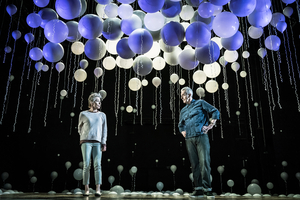Review: CONSTELLATIONS, Vaudeville Theatre
Quantum physics, beekeeping and the infinite possibilities of love

![]() A play featuring string theory, beekeeping and the same scenes repeated numerous times might not be the easiest sell. However, this revival of Nick Payne's contemplative and ingenious Constellations is smart, funny and exceptionally moving. The 70-minute drama explores love, life and death through the ever-changing story of a relationship and, in a flash of creative genius, has exploded back on to the West End with four different casts.
A play featuring string theory, beekeeping and the same scenes repeated numerous times might not be the easiest sell. However, this revival of Nick Payne's contemplative and ingenious Constellations is smart, funny and exceptionally moving. The 70-minute drama explores love, life and death through the ever-changing story of a relationship and, in a flash of creative genius, has exploded back on to the West End with four different casts.
Theoretical physicist Marianne meets beekeeper Roland at a barbeque and they fall in love. So far, so conventional, but Payne's creation challenges the expectations of the audience from the start. As the same situations reoccur, different outcomes happen; sometimes the couple fall in love, other times they barely converse. Payne elegantly knits complex elements of both string theory and colony collapse disorder into a brilliantly clear exploration of how events in different universes can be happening simultaneously.
Although there are some Stoppard-like complexities here, Payne demonstrates his own intelligence by not focusing too hard on the intricacies of the science. Every tiny choice that is made or not made creates a different universe to the one that previously existed. In the play, the milestones in a relationship such as sleeping together for the first time or breaking up are marked by slight variations in the choice of a word or the inflection used. These small differences become deeply significant and the infinite possibilities of life decrease as death moves closer. Do we truly have free will, or is everything pre-defined?
In a shrewd move to broaden appeal, add intrigue and, of course, increase ticket sales, the play will rotate four different couples during the run. Sheila Atim and Ivanno Jeremiah, Omari Douglas and Russell Tovey and Anna Maxwell Martin and Chris O'Dowd will all appear. This method should demonstrate the universality of the story and it will be fascinating to see how the different couples approach the writing.
If the scientific bent of the piece is off-putting, the acting will transfix you. On press night Peter Capaldi took the role of Roland and Zoë Wanamaker played Marianne. Wanamaker is brilliant; needy, intelligent, neurotic and desperate for control. As she confronts her own mortality, Wanamaker shows a huge range of emotion, from desperation to quiet acceptance. Capaldi is quieter and more reactive; observing Marianne, often keeping his distance and using a single gesture or word to change the course of a scene.
The necessary repetition in the play is incredibly challenging for the actors and requires deftness and agility to maintain the fast-moving pace. Both Capaldi and Wanamaker are incredibly dexterous in changing the rhythm and intonation just enough to make each scene unique. Both are also very funny, often twisting a single word to elicit laughter.
It is fascinating to see such a complex relationship build over such a brief playing time, given that there is no chemistry to speak of at the start. The story develops and evolves, as does audience engagement. By the end you are completely invested in both the couple and their relationship.
Donmar Warehouse Artistic Director Michael Longhurst's association with this play is long and his direction is intricate and intimate, yet feels fresh. Tom Scutt returns to his original design from the Royal Court, West End and Broadway productions, using a mass of white balloons that is beautiful and very evocative. Just a photo flash indicates set changes - a simple technique that is highly effective.
Constellations will challenge you, but it will also enthral, entertain and even break your heart.
Constellations is at Vaudeville Theatre until 12 September
Photo Credit: Marc Brenner


